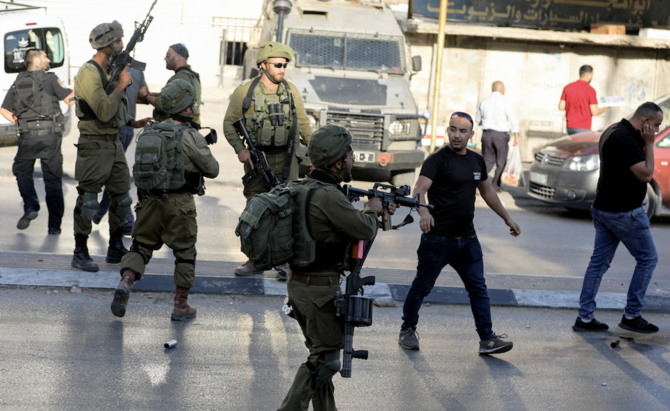
- ARAB NEWS
- 06 Jul 2025

RAMALLAH: Despite ongoing Eid Al-Fitr celebrations, Israeli military forces continued to storm Palestinian towns and arrest people in many parts of the West Bank and East Jerusalem amid violent confrontations on Saturday.
Palestinian observers expect an escalation in tension and violence after Eid, which began on Friday and continues until Sunday.
Violent confrontations broke out between Palestinian youths and Israeli border guards on Saturday after the guards stormed the Shuafat refugee camp north of Jerusalem. The soldiers fired rubber-coated metal bullets, stun grenades, and tear gas. No injuries were reported.
The Israeli forces continued to tighten measures at military checkpoints near Nablus in the northern West Bank. The city’s 150,000 residents were subjected to vehicle searches and ID checks.
In Beit Rima, northwest of Ramallah, the Israeli army arrested a 22-year-old man after a dawn raid on his family house. Clashes broke out but no injuries were reported.
In the town of Yatta, south of Hebron, Israeli settlers — under the protection of Israeli forces — destroyed Palestinian crops on Saturday.
Ratib Al-Jubour, the coordinator of the Popular Committees to Resist the Wall and Settlements in South Hebron, said that settlers released their livestock into farmers’ fields in Masafer Yatta, which led to the destruction of crops belonging to the Al-Zuwaidin family. A fistfight occurred between the land’s unarmed owners, who tried to remove the livestock, and the armed settlers, but the Israeli army came to the rescue of the settlers.
Meanwhile, Palestinian prisoner Khader Adnan, 44, from the town of Arraba, south of Jenin, continued his hunger strike for the 77th day in a row. He is being held in the Ramla Prison Clinic.
The Prisoners’ Club issued a statement saying that Adnan is dangerously ill and could die. Adnan has refused to accept any medical assistance and has been on hunger strike since his arrest on Feb. 5 after Israeli forces stormed his house in Arraba, near Jenin in the northern West Bank.
Adnan previously spent almost eight years in incarceration. He has been arrested 12 times and has staged six hunger strikes. The current one is his longest.
In a disturbing development, Israeli security forces stormed Al-Rahma Chapel in Al-Aqsa Mosque, cutting off the electricity and damaging its doors, according to Palestinian sources.
Ismat Nassour, a Palestinian expert on Israeli affairs, told Arab News that the Palestinian-Israeli peace efforts made by the US, Jordan, and Egypt hinged on the condition that the Israeli military halted incursions into Palestinian cities in the West Bank during the month of Ramadan.
He said he expected that the Israeli army would now restart military operations in the West Bank, resuming arrests and house demolitions and adding more military checkpoints. He noted that the Israeli army had deployed three additional battalions in the West Bank on Friday in anticipation of a surge in violence there.
Given the politically weak Israeli government, an escalation was imperative to gain public support, Mansour said.
He added that he also expected an escalation in East Jerusalem and the Al-Aqsa Mosque area, pointing out that Israeli provocation would generate violent Palestinian reactions, keeping the pot boiling.
Mansour said the West Bank was the only place where Israel could achieve a victory of sorts by improving its public image in Israel. The government fears an escalation with Hamas, which controls the Gaza Strip, or Hezbollah in southern Lebanon or Iran, he added.
Meanwhile, Ahmed Ghunaim, a prominent leader in the Fatah movement from East Jerusalem, told Arab News: “All indications are that this Israeli government is trying to solve its internal crisis by exporting it to the Palestinian side so that violence will soon be resurgent.
“The Israelis tried to demonize the month of Ramadan as a motive for the escalation of violence, but the main reason behind the violence is the Israeli occupation, not the month of Ramadan,” he added.